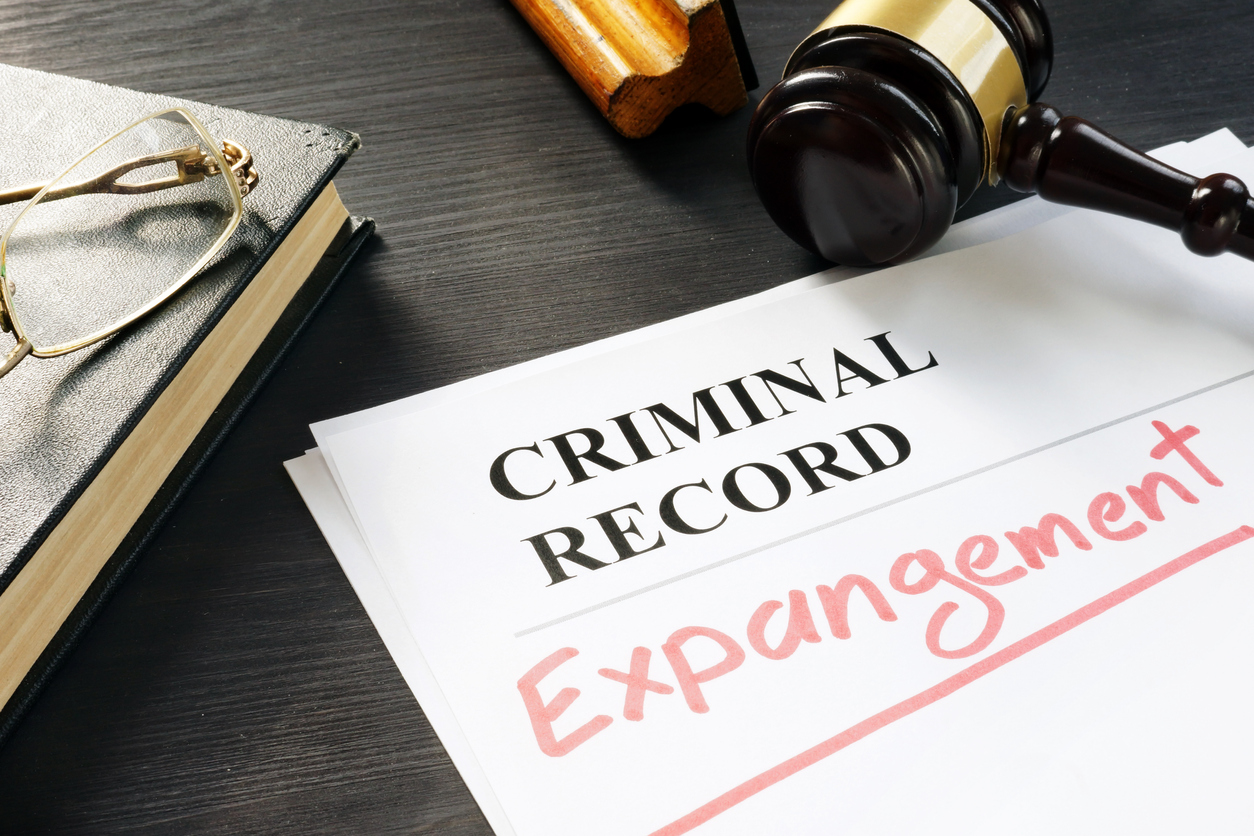Johnson County Expungement Lawyers
Helping Wipe Your Slate Clean

Expunging a prior arrest or conviction is an invaluable option in the criminal justice system. Many employers utilize background information in the hiring process. Landlords may deny a potential tenant from renting or leasing due to a prior conviction. Colleges will review your background prior to acceptance. Anyone seeking a fresh start should explore the possibility of expungement.
What Is Expungement?
Expungement is a legal process that allows individuals in Kansas to seal or erase certain criminal records from public view. This can be a valuable tool for those seeking a fresh start and improved access to employment, housing, and other opportunities.
Types of Records That Can Be Expunged in Kansas:
In Kansas, the following types of records may be eligible for expungement:
- Arrest Records: These records can be expunged under specific circumstances, such as mistaken identity, lack of probable cause, not guilty verdicts, or if it’s in the best interests of justice.
- Criminal Convictions: Certain criminal convictions may be eligible for expungement, provided that the required waiting period has passed, and the individual has not been convicted of a felony within the past 2 years. The waiting periods may vary based on the severity of the offense.
- Juvenile Adjudications: Many juvenile adjudications can be expunged if the individual has reached a certain age or a specific time has passed since the sentence was completed, there are no pending criminal cases, and the circumstances warrant expungement.
Eligibility Criteria for Expungement:
Understanding eligibility criteria is crucial when considering expungement. Here are some key factors to consider:
- Waiting Periods: For criminal convictions, waiting periods vary based on the nature and severity of the offense. Some convictions may require a 3-year waiting period, while others may require 5 years.
- Prior Convictions: Individuals must not have been convicted of a felony within the past 2 years to be eligible for expungement.
- Severity of Offense: Some crimes, such as capital murder or rape, are not eligible for expungement.
- Juvenile Adjudications: Eligibility for expunging juvenile adjudications depends on the individual’s age, the completion of the sentence, the absence of pending cases, and the circumstances.
For Arrest Records:
An arrest record can be expunged if:
- It was due to mistaken identity.
- A court found no probable cause for the arrest.
- You were found not guilty in court.
- Expungement is in the best interests of justice, and charges were dismissed or no charges are expected.
Is There A Time Limit For Expungements in Kansas?
There is no specific time limit for expunging arrest records.
For Criminal Convictions:
Criminal convictions can be expunged if certain conditions are met:
- A required amount of time has passed (typically 3 to 5 years, depending on the offense).
- You have not been convicted of a felony in the past 2 years.
Some convictions may be expunged after 3 years, which includes minor offenses, traffic violations, and select felonies. Others may be eligible after 5 years, such as certain motor vehicle offenses.
To determine eligibility, refer to a severity-of-crimes chart, which specifies waiting periods.
What Convictions Can Not Be Expunged In Kansas?
 Criminal Convictions That Cannot Be Expunged in Kansas Include:
Criminal Convictions That Cannot Be Expunged in Kansas Include:
- Capital murder
- First or second-degree murder
- Voluntary and involuntary manslaughter
- Rape
- Aggravated sexual battery
- Sexual battery of an underage victim
- Indecent liberties with a child
- Criminal sodomy
- Indecent solicitation of a child
- Sexual exploitation of a child
- Aggravated incest
- Endangering a child
- Abuse of a child
Regarding Voting Rights in Kansas:
- You can vote once you have been discharged from supervision, typically at the end of probation or parole.
- Only individuals convicted of a state or federal felony lose their voting rights.
- You must re-register to vote when eligible, and no proof of discharge from supervision is required.
For Juvenile Adjudications:
Juvenile adjudications can be expunged if certain conditions are met:
- The juvenile has reached age 23, or two years have passed since the sentence was completed.
- There are no pending criminal cases since completing the sentence.
- Circumstances and behavior warrant expungement.
Juvenile Adjudications That Cannot Be Expunged in Kansas Include:
- Murder
- Manslaughter
- Rape
- Indecent liberties
- Criminal sodomy
- Indecent solicitation
- Sexual exploitation
- Aggravated incest
- Endangering a child
- Abuse of a child
To expunge a juvenile offense, use an interactive interview for court filing. It can be filed at any age when two years have passed since final discharge, or at age 23, even without final discharge. The expungement of an adult conviction may allow you to expunge the juvenile conviction, with a $100 docket fee.
Improving The Situation For Both Adults And Juveniles
Our attorneys have extensive experience in criminal law and assisting people in expunging previous convictions and arrests. We have filed motions in numerous cities and counties in Kansas successfully expunging criminal arrests, convictions, charges and diversions.
We have successfully expunged juvenile adjudications. We understand the importance of giving a juvenile every opportunity to be successful and expunging an adjudication can benefit when applying for that first job or applying to college.
Steps For The Expungement Process in Kansas
 The expungement process in Kansas can be complex and involves several steps. Here’s a step-by-step guide to the expungement process in Kansas:
The expungement process in Kansas can be complex and involves several steps. Here’s a step-by-step guide to the expungement process in Kansas:
1. Determine Eligibility:
- The first step in the expungement process is to determine whether you are eligible for expungement. Eligibility criteria vary depending on the type of offense, the nature of the conviction, and the waiting period.
2. Consult with an Attorney:
- It is highly recommended to consult with an experienced expungement attorney in Kansas. An attorney can assess your eligibility, guide you through the process, and help you prepare the necessary documents.
3. Obtain Your Criminal Record:
- You should obtain a copy of your criminal record from the Kansas Bureau of Investigation (KBI) or the local law enforcement agency. This record will help you identify the specific records you want to expunge.
4. Complete Required Waiting Period:
- Ensure that you have completed the required waiting period for the type of record you wish to expunge. The waiting period varies based on the nature of the offense and whether you have subsequent convictions.
5. Prepare the Expungement Petition:
- Work with your attorney to prepare a formal expungement petition. This document should include your personal information, details of the charges or convictions you want to expunge, and the reasons for seeking expungement.
6. File the Petition:
- File the expungement petition with the appropriate court in the county where the conviction or arrest occurred. Pay any required filing fees.
7. Serve Notice to Relevant Parties:
- Depending on the circumstances, you may need to serve notice of the expungement petition to relevant parties, such as the prosecutor’s office or law enforcement agencies. Your attorney will guide you through this process.
8. Attend a Court Hearing:
- In some cases, you may be required to attend a court hearing. Your attorney will represent you and present your case to the judge. The judge will consider the evidence and make a decision.
9. Court Decision:
- The judge will review your expungement petition and any evidence presented at the hearing. They will then decide whether to grant or deny the expungement request.
10. Notification of Expungement: – If the judge grants your expungement petition, you will receive an order of expungement. This order will specify which records are to be sealed or expunged.
11. Notification to Relevant Agencies: – Your attorney will ensure that the relevant agencies, such as the KBI and local law enforcement, receive a copy of the expungement order and are informed to seal or remove the specified records from public view.
12. Monitoring the Process: – After the expungement order is granted, it’s essential to monitor the process to ensure that all relevant agencies comply with the order and seal or remove the records as required.
13. Enjoy the Benefits: – Once the records are expunged, you can enjoy the benefits of a clean record, including improved employment and housing opportunities.
Why Expunging Your Criminal Record in Johnson County Matters
At our law firm, we understand that your past shouldn’t define your future. That’s why we’re here to shed light on the crucial benefits of expunging your criminal record in Johnson County, Kansas. With the expertise of a seasoned Johnson County expungement lawyer, you can take proactive steps toward reclaiming your reputation and unlocking a brighter tomorrow.
Expungement isn’t just about erasing a stain on your record; it’s about reclaiming your narrative and moving forward with confidence. In Johnson County, expunging your criminal record can open doors that were once closed. Reasons to pursue an expungement include:
- Pursuing better job opportunities
- Securing housing
- Or simply enjoying peace of mind.
Our dedicated team is committed to guiding you through every step of the expungement process, ensuring that you understand your rights and have the support you need to navigate this important legal journey. With our tailored approach and unwavering advocacy, you can trust that your future is in capable hands. Don’t let past mistakes hold you back—take control of your future today with the help of a trusted Johnson County expungement lawyer.
Unveiling the Path: Expungement Eligibility in Johnson County
Navigating the path to expungement in Johnson County, Kansas begins with understanding the eligibility criteria and the factors that come into play during the petition process. Our seasoned Johnson County expungement lawyers are here to shed light on the essential requirements and considerations to help you determine if expungement is within reach
Criteria for Qualifying for Expungement:
- Completion of Sentence: Generally, individuals must have completed their sentence, including any probation or parole.
- Eligible Offenses: Certain offenses may be eligible for expungement, while others may not qualify.
- Waiting Period: There is typically a waiting period before an individual becomes eligible to petition for expungement.
- Limited Prior Convictions: Some jurisdictions limit the number of prior convictions a person can have to qualify for expungement.
- Good Behavior: Demonstrating rehabilitation and good conduct since the conviction is often a crucial factor.
Factors Considered in Expungement Petitions:
- Criminal History: The nature and severity of past offenses play a significant role in the expungement process.
- Conduct Since Conviction: Courts consider an individual’s behavior and contributions to society since the conviction.
- Purpose of Expungement: Courts may evaluate the reasons behind seeking expungement, such as employment or housing opportunities.
- Community Impact: The potential impact of expungement on public safety and the community may also be considered.
Understanding these criteria and factors is key to determining your eligibility for expungement. Our Johnson County expungement lawyers are dedicated to guiding you through this process, offering personalized advice and dedicated representation every step of the way. With our unwavering commitment to your success, you can trust that your expungement journey is in capable hands.
Clearing Your Record: Dedicated Guidance from a Johnson County Expungement Lawyer
Are you seeking to expunge your criminal record in Kansas but unsure if you need legal representation? Navigating the intricacies of expungement laws can be daunting, especially in Johnson County. However, having the right legal counsel can make all the difference in achieving a successful outcome. Our seasoned attorneys are skilled in expungement cases, offering guidance and support to individuals seeking a fresh start.
Expungement, the legal process of sealing or erasing criminal records, can significantly impact your future opportunities, from employment prospects to housing options and beyond. While Kansas law provides avenues for individuals to pursue expungement without legal representation, enlisting the services of a Johnson County expungement lawyer can streamline the process and increase the likelihood of a favorable outcome.
Here’s why partnering with our firm can make a difference:
- In-depth Knowledge: Our attorneys possess a comprehensive understanding of Kansas expungement laws, ensuring that your case is handled with precision and expertise.
- Personalized Guidance: We recognize that every expungement case is unique. Our team provides personalized guidance tailored to your specific circumstances, offering clear insights and strategies to navigate the legal complexities effectively.
- Streamlined Process: With our experience and resources, we work diligently to expedite the expungement process, minimizing delays and maximizing efficiency for our clients.
- Advocacy and Support: From the initial consultation to the final resolution, we advocate tirelessly on behalf of our clients, providing unwavering support and representation at every stage of the expungement process.
Whether you’re facing obstacles due to past mistakes or aiming to pursue new opportunities unencumbered by a criminal record, our Johnson County expungement lawyers are here to help you chart a path forward. Contact us today to schedule a consultation and take the first step towards a brighter future.
Begin Your New Future
In Kansas, many convictions or diversions for crimes such as theft, possession of marijuana and battery are eligible for expungement three years after the satisfaction of the sentence imposed by the court. While not all crimes are eligible for expungement, other crimes do become eligible after five year or seven years.
Don’t let your past define your future. It is never too early to begin thinking about your options. Let our local Johnson County expungement attorneys help you.
Contact The Expungement Lawyers at Henderson Legal Defense
Henderson Legal Defense approaches each case with compassion and a commitment to helping individuals move forward positively. We understand the challenges associated with a criminal record and aim to provide support throughout the process.
Clearing one’s record and starting anew can be a life-changing process, and Henderson Legal Defense, LLC, is dedicated to helping clients achieve this goal. Their experience, legal knowledge, and personalized approach make them a valuable resource for individuals seeking to leave their past behind and embrace a brighter future.
For more information, schedule an initial consultation at Henderson Legal Defense, LLC Attorneys at Law, by filling out our online intake form or calling (913) 782-4030 today. We serve clients throughout Kansas City and Johnson County including in Overland Park, Olathe, Shawnee, and Lawerence.
Our lawyers are licensed to practice in Missouri and Kansas.
Expungement FAQs
Eligibility for expungement in Kansas depends on the type of offense and the individual’s criminal history. Generally, non-violent and non-sexual offenses are more likely to be eligible.
The waiting period varies based on the type of offense and conviction. Typically, individuals must wait at least 3 to 5 years after completing their sentence or probation.
Yes, it is possible to expunge some felony convictions in Kansas, but eligibility criteria are strict, and not all felonies can be expunged.
To begin the expungement process, you typically need to file a Petition for Expungement in the appropriate Kansas court. Consulting with an attorney is highly recommended to ensure you meet the eligibility criteria and complete the process correctly.
Expungement in Kansas seals or erases records from public view, but certain entities, such as law enforcement and some government agencies, may still have access to the sealed records.
If your expungement petition is denied, you may have the option to appeal the decision. Consult with your attorney to explore this possibility.
Expungement can have several benefits, including increased job and housing opportunities, the ability to deny or omit the expunged offense on job applications, and a fresh start.

